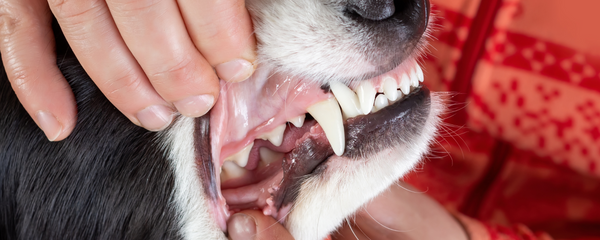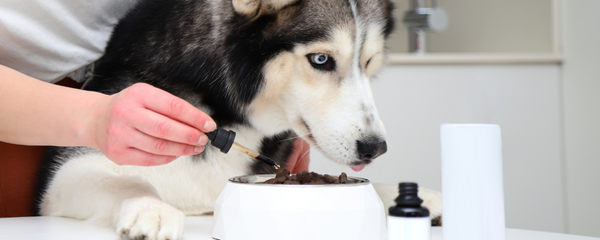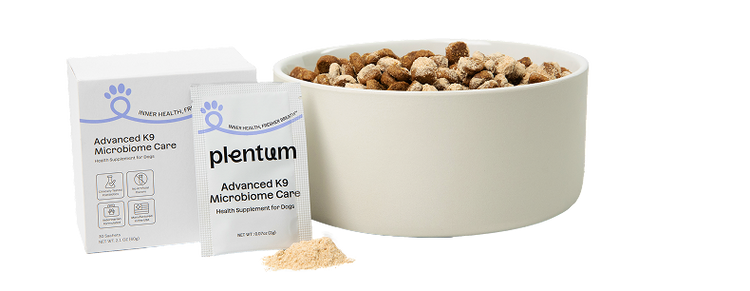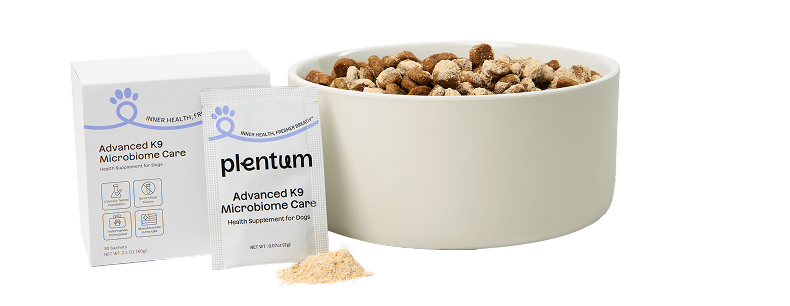A dog's gut health is vital for their overall well-being1. It affects their immune system, energy levels, and even their mood. Many pet parents overlook the importance of gut health, yet it can lead to serious health issues if ignored. A raw diet for dogs might improve gut health; however, it should be approached with caution and professional guidance. Regular veterinary check-ups are essential to monitor and maintain a dog's gut health effectively. In this article, we will explore the alarming signs of poor gut health in dogs and discuss how to address these issues.
Why Gut Health Matters for Dogs
Gut health is a cornerstone of a dog's overall health1. It plays a pivotal role in digestion and nutrient absorption. A healthy gut can prevent various ailments and infections in dogs. An unhealthy gut can lead to serious complications, including malnutrition and weight loss. Dogs with poor gut health might show signs such as dull coats and low energy. These signs can often be misleading if not properly identified2. Several factors contribute to maintaining a healthy gut in dogs, including:
- A balanced diet tailored to the dog's specific needs
- Hydration to support digestion
- Regular exercise to stimulate the digestive system
- Consistent feeding schedules to regulate digestion
Prevention and management of digestive issues in dogs are key. Awareness of gut health aids in early detection and intervention, helping pet parents take the right steps to enhance their dog's quality of life. Implementing good gut health practices can significantly improve a dog's well-being. Understanding the complexities of your dog's digestive system is a step towards a longer, healthier life for your pet.

1. Persistent Digestive Issues (Diarrhea, Vomiting, Gas)
Persistent digestive issues in dogs are concerning signs of poor gut health. Diarrhea, vomiting, and excessive gas can indicate an imbalance in the gut microbiome. These symptoms often cause discomfort and distress for both dogs and their owners. Diarrhea in dogs can arise from numerous causes, including infections, stress, or sudden diet changes. Food intolerance or allergies can also contribute to this condition. Identifying the root cause is crucial for effective treatment. Vomiting can be another alarming symptom of digestive trouble. Occasional vomiting might not be serious, but frequent episodes suggest an issue. Dog food intolerance symptoms often include vomiting, signaling the need for dietary adjustments. Excessive gas is another sign that should not be ignored. It may accompany other digestive issues, indicating a poorly functioning digestive system. It can result from improper digestion of certain foods or underlying health problems. Addressing persistent digestive issues requires a comprehensive approach. Here are some strategies pet parents can consider:
- Monitor dietary changes and introduce new foods gradually
- Provide high-quality, easily digestible meals
- Ensure the dog stays hydrated
- Reduce stress through regular exercise and mental stimulation
- Consult a veterinarian for persistent or severe symptoms
Early detection and intervention can help manage these symptoms effectively. Understanding how these symptoms relate to gut health prevents further complications. If your dog experiences prolonged digestive issues, it’s essential to seek professional advice. This ensures proper diagnosis and management of any underlying conditions, safeguarding your pet’s overall health.
2. Bad Breath in Dogs
Bad breath in dogs is often more than just an annoyance. It can be a sign of underlying health issues, particularly related to their gut. While dental problems are a common cause, poor gut health can also contribute significantly3.
When the gut is imbalanced, harmful bacteria may overpopulate. These bacteria produce foul-smelling compounds that can lead to bad breath. It's essential for pet parents to notice this sign as it might indicate broader health concerns. Consider these potential reasons for bad breath related to gut health:
- Imbalance in gut bacteria leading to increased production of smelly gases
- Poor digestion resulting in leftover food fermenting in the gut
- Toxins from food intolerances contributing to foul odor
For some dogs, bad breath can accompany other digestive issues, such as vomiting, loose stools, or bloating. Understanding the link between these problems can guide pet parents towards the right interventions. Addressing bad breath involves improving both oral and gut health. Regular dental hygiene is crucial, but diet plays a vital role too. Feeding a balanced diet can support a healthy gut microbiome, which helps reduce the occurrence of bad breath and associated digestive issues. Consider consulting a veterinarian for a comprehensive health check if your dog's bad breath persists despite good oral hygiene and a balanced diet. Identifying the root cause ensures the most effective treatment.
3. Signs of Malnutrition in Dogs
Malnutrition in dogs is a serious concern that often stems from poor gut health. When a dog's digestive system isn't functioning correctly, it struggles to absorb essential nutrients. This lack of nutrients can lead to visible signs of malnutrition and affect the dog's overall health4.
A dog's coat can serve as an indicator of nutritional health. Malnutrition often results in a dull, brittle coat and excess shedding. This happens because the body lacks sufficient proteins and fatty acids to support a healthy coat. Another alarming sign is unexpected weight loss. Dogs that are unable to absorb nutrients properly will lose weight even with a normal diet. Rapid or unexpected weight loss should always prompt a veterinary consultation. Additional signs of malnutrition in dogs can include:
- Lethargy or lack of energy
- Dry, flaky skin
- Muscle weakness
- Stunted growth in puppies
Understanding these symptoms can help pet parents intervene quickly. A balanced diet is crucial to provide all necessary vitamins and minerals. Without proper nutrition, other health issues such as organ failure could arise. Correcting malnutrition often involves evaluating and changing the dog's diet. This may include incorporating supplements to address specific deficiencies. For some dogs, a carefully planned raw diet may offer benefits. However, this approach requires guidance from a veterinary nutritionist to ensure safety and balance. Ultimately, addressing malnutrition requires a comprehensive approach. Regular vet visits and monitoring can ensure that dietary adjustments are effectively meeting the dog's needs. By doing so, pet parents can help restore their pets' health and vitality.
4. Skin and Coat Problems
A dog's skin and coat reflect its inner health, especially gut health. Poor digestion can manifest visibly, with skin and coat being early indicators. When a dog's gut isn't absorbing nutrients properly, skin and coat issues often arise. One common problem is dry, itchy skin. This can lead to constant scratching and even hair loss. Dogs with poor gut health may also experience more frequent skin infections. These conditions arise when the immune system is compromised due to inadequate nutrient uptake. Other skin and coat issues that may indicate poor gut health include:
- Dull and brittle hair
- Excess shedding
- Red, inflamed skin
- Oily or greasy coat
A nutrient-rich diet plays a crucial role in maintaining skin health. Vital nutrients like omega fatty acids and vitamins A and E support a shiny coat and resilient skin. Without these, a dog's appearance may quickly deteriorate. Improving gut health can significantly enhance a dog's skin and coat. Diet changes to include high-quality ingredients, either in commercial food or a carefully managed raw diet for dogs, can make a substantial difference. Always consult a vet before making dietary alterations to ensure they suit your dog's specific needs. Ultimately, skin and coat problems are not just superficial issues. They indicate deeper, unseen problems with a dog's gut health. Addressing these concerns promptly can prevent further health complications, promoting a happy and healthy pet.
5. Changes in Behavior and Energy Levels
Behavioral shifts often signal underlying health issues in dogs. Poor gut health can be a significant factor. A dog's gut is closely linked to its brain. When the gut is off-balance, it can affect your dog's behavior. A dog with gut issues might show signs of lethargy. They may be less interested in playing or might sleep more. Additionally, you may notice increased anxiety or irritability, as discomfort from digestion impacts their mood. Keep an eye out for these behavior changes:
- Decreased interest in play
- Unusual lethargy or sleepiness
- Increased anxiety or restlessness
Dogs thrive on routine and energy consistency. A sudden drop in energy levels can be troubling. If you notice these changes, it could be indicative of nutrient absorption issues. This is often due to the gut not functioning properly, leading to energy drain. Addressing your dog's diet and gut health can help restore their energy and vitality. Ensure they get balanced nutrition that supports both their digestive health and energy needs. Always seek veterinary advice if behavior shifts persist.
Common Causes of Poor Gut Health in Dogs
Poor gut health in dogs can stem from various sources. Understanding these causes is crucial for prevention and care. A primary factor is diet. Unbalanced nutrition or sudden dietary changes can upset a dog's digestive system. Stress and anxiety also play significant roles. Dogs are sensitive creatures, and emotional distress can affect their gut health. Situations such as moving homes or changes in household members can be triggers. Several common issues can lead to poor gut health:
- Inconsistent or poor-quality diet
- High stress levels or anxiety
- Infections or parasites in the digestive tract
Moreover, food intolerances or allergies can contribute to digestive troubles. Identifying potential food triggers is critical to avoid ongoing gut health issues. It's important to monitor your dog's reaction to different foods. Regular check-ups with a veterinarian can help identify these issues early, ensuring your pet maintains good gut health throughout its life.
How to Support and Improve Your Dog’s Gut Health
Supporting your dog's gut health involves a proactive approach. One effective way is to ensure a balanced diet tailored to their needs. Consider consulting a vet before making significant dietary changes, especially if considering a raw diet for dogs. Probiotics and prebiotics can play a pivotal role in promoting a healthy gut microbiome. These beneficial bacteria support digestion and help prevent digestive issues in dogs. Including them in your dog's diet can enhance their immune system and overall well-being. Besides dietary interventions, regular exercise is crucial. Physical activity stimulates digestion and helps maintain a healthy weight. It also alleviates stress, which can negatively impact gut health. Here are some tips to improve your dog's gut health:
- Introduce probiotics and prebiotics into their diet
- Maintain a consistent feeding schedule
- Provide regular exercise
- Ensure fresh, clean water is always available
Moreover, avoid abrupt food changes that can disrupt digestion. Gradual transitions between foods are less likely to cause an upset stomach. Finally, regular vet check-ups are indispensable for early detection of potential issues. Being observant and responsive to your dog's needs ensures they maintain excellent gut health.
When to See a Veterinarian
Identifying when to seek professional help is crucial for maintaining your dog's health. If you notice persistent signs of poor gut health that don't improve within a few days, it's time to consult your veterinarian. Symptoms like chronic diarrhea, vomiting, or drastic weight loss may indicate a serious underlying condition. Additionally, if your dog exhibits severe discomfort or unusual behavior, prompt veterinary advice is essential. Early intervention can prevent minor issues from escalating into more significant health problems. Regular check-ups allow veterinarians to monitor gut health and provide tailored advice to keep your furry friend happy and healthy. Remember, a proactive approach ensures the best outcomes for your dog's well-being.
Conclusion
Understanding the signs of poor gut health in dogs can make a significant difference. By staying vigilant and informed, you can ensure your pet remains vibrant and healthy. Take proactive steps to support their digestive system, and consult with your veterinarian when needed. Doing so will enhance your furry companion's well-being and give you peace of mind, knowing you're providing them with the care they deserve.







